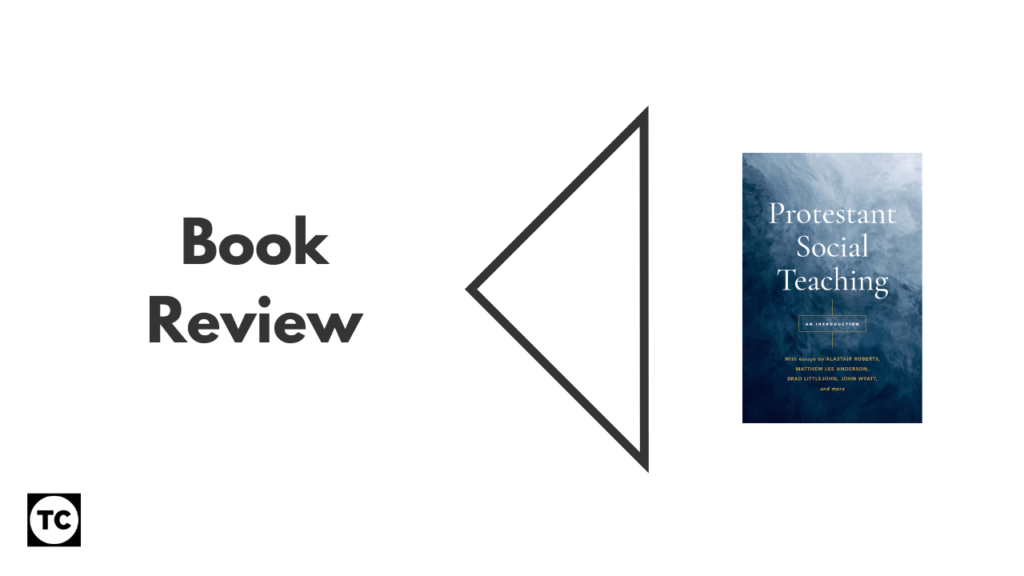
One of the books I picked up at some academic conferences in Denver last month was this, Protestant Social Teaching: An Introduction, from the Davenant Institute. With essays from some folk whose work I’ve appreciated before (like Matthew Lee Alistair Roberts and John Wyatt), others I know less well but have positive vibes about, and some thinkers I’d never heard of, I was interested to see how the volume would come together – both as an example of Protestant Social Teaching, and as a volume from a relatively new press/publisher who I primarily know for retrieval/updates.
After an appetite-whetting intro, Hutchinson’s chapter on the law is a good opening to the book. Brad Littlejohn’s chapter on ‘the civil magistrate’ demonstrates a definite reformation consensus on the high value of civil authority. A really important essay, I think, particularly with the COVID lockdowns and similar things forcing the question back on the table. Marc Livecche pens a helpful overview of just war theory in the Christian tradition – from Augustine to Niebuhr, by way of Calvin. Encouraging to see the imago dei threaded throughout – this vital doctrine pops up in several essays in this volume, confirming some of my theological-ethical instincts. Matthew Lee Anderson on procreation and children is great but I would liked to have had longer to hear from him! Interesting account of divergent themes within the tradition. Definitely engaging with ethical questions that many don’t ask but all answer in some way. Kamel and Roberts’ chapter on sex marriage and divorce (not much on divorce beyond a brief survey of differences between Reformers) is helpful for reminding us that culture constantly fluxes, “This is the deep insight of the Reformers: marriage and family are disordered by the Fall, but they are also means by which this disorder is overcome“.
Wedgeworth has collated a careful and thorough survey of pre-biblical, biblical and church historical reasons why the Protestant position should be pro life. Fascinating disagreement in the tradition about soul formation. “The Christian church has maintained a robust anti-abortion position from its earliest days” – it is sobering to note how it has been Protestantism, and not just in liberal forms, which has diverged on this. John Wyatt’s chapter on death and dying is typically calm, measured and wise. And as he notes “the historical roots of modern healthcare are embedded in a Christian understanding of what it means to be human”. Minich and Redemer have penned an idiosyncratic but fascinating essay on work and labour. One line that stuck out to me was the challenge for the Christian jn a mundane job: “the vocation is to offer hope to a hopeless workplace“. Enlow pens what is probably the first theological reflection on private property that I’ve seriously read. Most interesting point is probably christological (though perhaps in lieu of a more fully realised doctrine of creation): “Gods ownership and incarnation is not an invitation to abolish the property or the body, but an anticipation of our right relationships to our bodies and to our property”. Calhoun’s chapter on ‘Taxation and Welfare’ is good, particularly in breadth and depth. Interesting choice of figures in recent times, ending on Rowan Williams. Meador’s chapter on environmental care is actually the weakest imo – minimal engagement with tradition and a sort of reliance on sacramentology rather than doctrine of creation or anthropology.
It is probably predictable to write that this is quite a Protestant volume for two reasons – firstly, a high and healthy view of the fall, and secondly that there is evidence of divergence in the tradition and the possibility of disagreement between the contributors. That this is a multi-author work, without a headlined editor, is a demonstration of what Protestant social teaching/ethics can look like – contra, for example, a Roman Catholic magisterium. As noted, I was encouraged by the occurrence of mentions of the Doctrine of the Image of God here – but with that in mind was surprised not to have as common appearing or high a view of the Doctrine of Creation, particularly in Meador’s chapter on environmental care (I might point to my recent AAR paper for a more recent piece of retrieval). I’m also intrigued by the way Scripture is used/handled/treated in the various essays – something that is both a bug and a feature of the Protestant tradition, perhaps. However, as an introduction to Protestant positions on some key social issues, this is a helpful and useful book, for both historic and contemporary thinking. Slightly let down by a few typos, it’s still something I’d recommend and will revisit for various projects.
Windy London
Us Brits SHOULD be leading the way in this as British Evangelicalism (pre 1920’s Great Reversal) was always “Both And” whereas American Evangelicalism struggled with trying to justify Christian impact on society, because they had retro fitted their version of Calvinism. They had taken away any current world impact of teachings about love for our fellow man, ensuring our love only extends to the state of someone’s eternal soul and never impinged on the continuation of slavery etc. Here in the UK Evangelicals like Shaftesbury didn’t stop with slavery but looked for Christian social reforms in mental health, working conditions for the young, the poor, the elderly. Shaftesbury was a Tory!
It’s a pity we don’t have more Brits looking at this from a Conservative Evangelical standpoint.